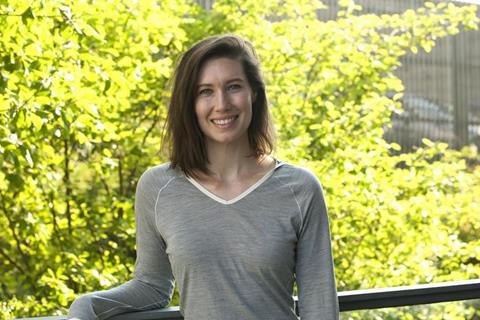Sara Clasen, a postdoctoral fellow in the Institute for Biomedical Sciences at Georgia State University, is the grand prize winner of the prestigious 2023 NOSTER & Science Microbiome Prize.

The NOSTER & Science Microbiome Prize was established to reward innovative research by young investigators that is focused on the functional attributes of microbiota of any organism and has the potential to contribute to understanding of human or veterinary health and disease or guide therapeutic interventions.
The grand prize winner will receive a cash prize of $25,000 and travel and accommodation for the prize ceremony Oct. 6 in Kyoto, Japan. The winner will also have their winning essay published in the journal Science and receive a free five-year digital subscription. During the ceremony, Clasen will give a short presentation about her research.
Noster Inc., based in Kyoto, specializes in research and development of gut microbiome-based drug discovery and sponsors the award. Science has the largest paid circulation of any peer-reviewed general science journal in the world, according to the journal’s website.
Award-winning work
Clasen received her bachelor’s degree from the University of Arizona in Tucson, Ariz., and a Ph.D. in cell biology from Johns Hopkins School of Medicine in Baltimore. She began the award-winning work as a postdoctoral fellow in the lab of Ruth Ley, director of the Department of Microbiome Science at the Max Planck Institute for Biology in Tübingen, Germany.
For this project, she collaborated with Andrew Gewirtz, a Regents’ Professor and Distinguished University Professor in the Institute for Biomedical Sciences at Georgia State. In July 2023, Clasen moved back to the United States and joined Gewirtz’s lab in the Institute for Biomedical Sciences as a postdoctoral fellow.
Her research examines immune responses to commensal microbiota, or bacteria that act on the host’s immune system to induce protective responses that prevent invasion by pathogens. To win the NOSTER & Science Microbiome Prize, Clasen wrote a 1,000-word essay titled “The Sound of Silence” that was based on a research study she published in Science Immunology in January 2023.
Silent flagellins
The essay and study describe her team’s investigation into how some commensal bacteria that produce flagellin are able to avoid immune activation. Flagellin is part of bacterial flagellum (a slender, whiplike structure that provides movement to microorganisms and cells) that is responsible for stimulating Toll-like receptor 5 (TLR5)-mediated immune responses, the journal article explained.
The research study discovered a class of “silent” flagellins that bound to the innate immune receptor TLR5, but only induced weak immune activation.
The study explored the prevalence of silent flagellins in the human gut and measured their abundance in more than 1,700 human gut metagenomes from around the world.
Industrialization link
“Our analysis revealed that silent flagellins are ubiquitous,” Clasen wrote in the award-winning essay. “However, their levels are substantially lower in populations from industrialized regions. The factors behind this loss are unclear, as are the consequences for human health.”
The findings suggest that industrialization changes which flagellated commensals colonize the human gut, which could explain the increased incidence of inflammatory bowel disease (IBD) in Westernized nations.
Clasen will continue to explore the role of silent flagellins at Georgia State using animal models. Following her postdoctoral work, she aspires to become a principal investigator with her own research lab that focuses on the immune response to commensal microbiota.
Read Clasen’s prize-winning research here: https://www.science.org/doi/10.1126/science.adi6265.







No comments yet